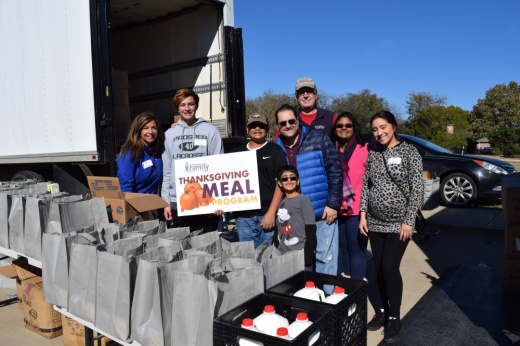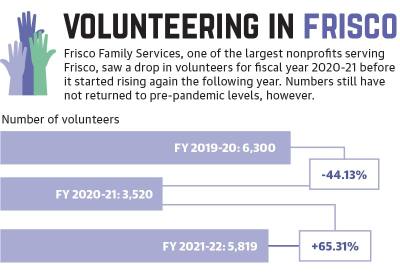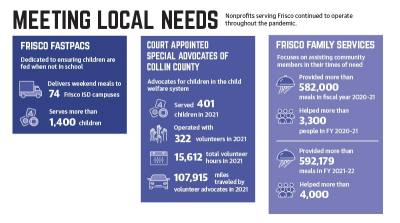At a time when community needs were high, nonprofits adapted to having fewer volunteers and in the process developed programs and initiatives that continue to be used even as COVID-19’s hold begins to wane.
Frisco Family Services—a nonprofit focused on providing assistance to community members experiencing hardship—has seen a 65% increase in volunteer numbers since its low of 3,520 volunteers in the 2020-21 fiscal year at the height of the pandemic. However, the most recent numbers from June show the nonprofit is still operating with nearly 500 fewer volunteers than it did before the pandemic started.
“Our volunteer numbers are increasing, but they’re not where they were because many of our volunteers are older individuals that were a part of the vulnerable population,” said Nicole Bursey, Frisco Family Services executive director.
In another shift toward normalcy following COVID-19 restrictions, Court Appointed Special Advocates of Collin County—a local nonprofit that serves children removed from their homes due to neglect or abuse—is back to hosting advocate training in person after moving to online training during the pandemic, according to CEO and President Tricia Clifton. CASA also reported training 83 volunteers in its most recent fiscal year report from 2021, which is close to prepandemic levels after dropping to about 50 trainees during the first year of the pandemic.
Frisco Fastpacs, which focuses on providing meals to students when they are not in school, is planning to ease the restriction on the number of volunteers for its Community Pack—or meal prep nights—after limiting numbers to allow for social distancing during the pandemic, Executive Director Heather Canterbury said.
Lessons learned
Frisco Family Services provides a food market, emergency financial assistance, life skill workshops, seasonal programs and a Frisco resale store, and Bursey said one of the nonprofit’s tasks now is to help clients who are still looking for a job while living with COVID-19-related health issues.
Throughout the pandemic, Frisco Family Services learned to adapt and go the extra mile to demonstrate empathy for people served, Bursey said.
“We learned early on that there was some hesitancy about coming to the market for food, and a lot of that had to do with the fact that we were seeing people that had never utilized services before,” she said.
Last year, Frisco Family Services started a pilot program called Market Express that presented an online shopping alternative for those who do not feel comfortable with in-person shopping or have limited availability, Bursey said. Shoppers can access an online shopping list, make selections and schedule a pickup time at the Frisco Family Services Market, according to Frisco Family Services’ website.
“That showed us that we could pivot and change how we do what we do in a way that is meaningful and makes sense for our clients,” Bursey said.
Moving forward, Bursey said it is important for Frisco Family Services to be prepared to meet the needs ahead and to be intentional in raising money to continue to support a fast-growing community, such as Frisco.
During the pandemic, CASA officials found that switching to virtual visits with clients actually gave CASA volunteers a chance to interact more frequently with children, parents and partners, Clifton said. She said the organization found cases that came forth during the pandemic were much more severe in nature and required specialized training as well as greater oversight and support.
Clifton said CASA of Collin County will continue to support every child who comes into the child welfare system by ensuring a well-trained arsenal of volunteer advocates are provided. The organization’s biggest need is in finding bilingual volunteers to help serve youth, she said.
“Child abuse did not disappear with the pandemic, it became less public,” Clifton said.
‘Giving Day’ effect
COVID-19 caused increased needs for funding and resources so nonprofits could rework programs during the pandemic, and North Texas Giving Day—a day for people donate to nonprofits and sign up to volunteer—proved pivotal in helping nonprofits through difficult times, Community Engagement Director Chris McSwain said.
North Texas Giving Day is usually held once a year in September. However, in 2020, the Communities Foundation of Texas planned a second event, called North Texas Giving Tuesday Now, in May along with the usual day in September, McSwain said.
North Texas Giving Tuesday Now raised $21 million in addition to North Texas Giving Day raising $58.8 million in 2020, according to the Communities Foundation’s annual report. The event raised $50 million in 2019.
The 13th annual North Texas Giving Day in September 2021 raised about $66 million, and nearly 23,000 volunteers signed up to help area nonprofits. The average participating nonprofit raised $19,608, while one in five donors pledged volunteer hours, according to North Texas Giving Day’s website.
“It really just demonstrates how committed people are and how much people want to be a part of something bigger,” McSwain said.
Additional reporting by William C. Wadsack







